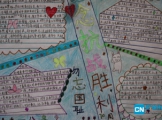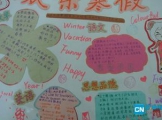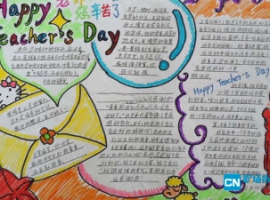2016庆元旦迎新年手抄报资料
yuandan is the first day of the lunar calendar. it is the day when the earth has circled the sun for one round and is beginning another circling. it represents a new beginning when people send off the old days and welcome the new ones. as the first day of the year, yuandan has been considered to be the most important festival since the ancient times.
customs
1. kaisui(beginning of the year): according to the chinese traditional custom, starting from haishi(9p.m. to 11p.m.)of the last evening of the twelfth lunar month, each family must prepare offering s to deities at the altar. at the same time, they too prepare food for the new year day: the whole family will then stay awake together to attend to the year(called shou sui). after haishi, zishi(11p.m. to 1a.m.)will come, and this is the arrival of new year(yuandan). at this moment, people begin the celebration with fireworks. vegetarian and sweet foods will then be placed are the altar for offerings, and incense be burned to welcome the deities. in the ancient times, it was believed that haishi connected the two years and thus was called kaisui.
at the same night, some families will follow the instruction in tongshu and place preparing altar in the direction of the "fortune deity" during the "fortune time" to receive the deity. if the direction of the "fortune deity" is at the "ill position", people will choose to receive "happy deity" or "noble deity" instead.
2. there is an apparent difference in the custom of food taking on yuandan between the chinese in the northern and southern regions. the northern chinese has the habit of taking jiao zi(dumpling made of flour with vegetable and meat wrapped inside). some people may put a sweet or a coin inside jiao zi, hoping to have a sweet year after tasting the sweet and a wealthy year after tasting the coin. on the other hand, the southern chinese have the taboo for killing on yuandan. therefore, they do not take meat in tee morning of yuandan, so as to avoid bloodshed or mutual slaughter. in order to evade misfortune, they have the first meal of this day without meat. instead, they take vegetarian food for the sake of virtue.
3. what is special during the new year is that parents or elders will distribute red packets(ang pao or ya sui qian)to the children. people in the ancient times were more particular in giving away the red packets: the distribution took place on the eve of new year so that the kids could suppress the past year and enter the new year. ya sui has the meaning of overcoming the unpredictable future. representing the wishes for the healthy psychological growth of the children, ya sui qian symbolises the elders' hope to see their children overcome all the unpredictable elements brought by the "year".
【2016庆元旦迎新年手抄报资料】相关文章:
1.2015迎新年、庆元旦手抄报内容资料
2.2016庆元旦手抄报资料
3.关于2016猴年庆元旦手抄报的资料
4.2016年欢庆元旦手抄报图片资料
5.2016猴年迎新年手抄报资料有哪些
6.迎新年的手抄报资料
7.五年级迎新年庆元旦手抄报资料
8.2016迎新年黑板报资料 |



































